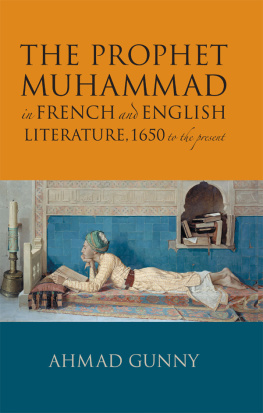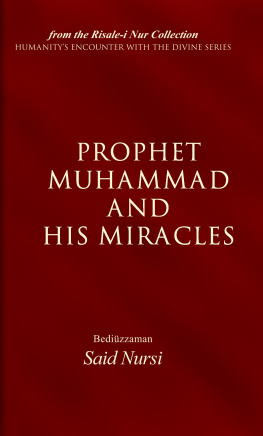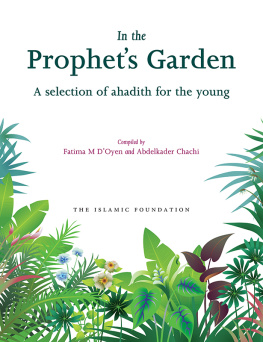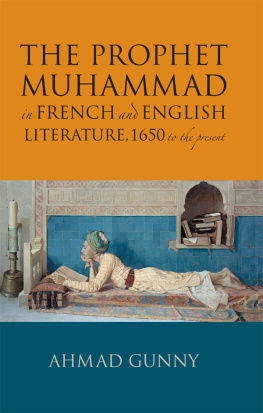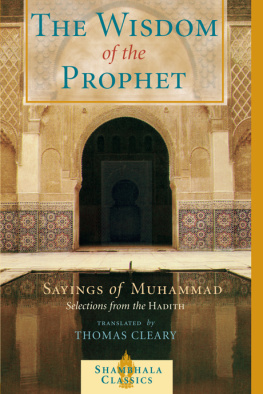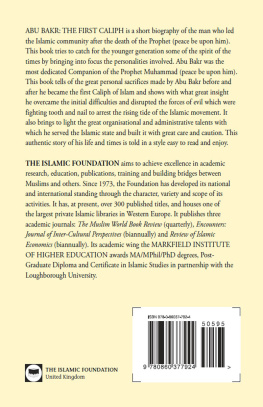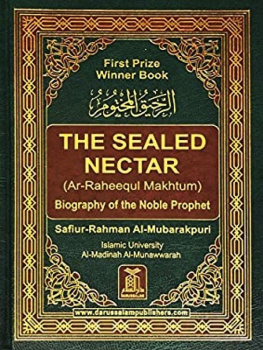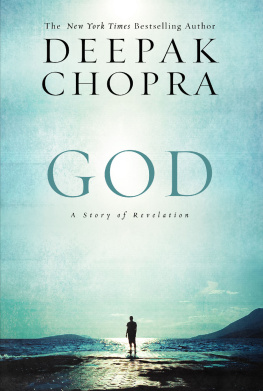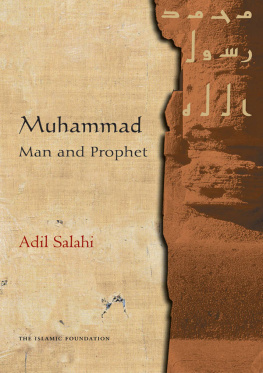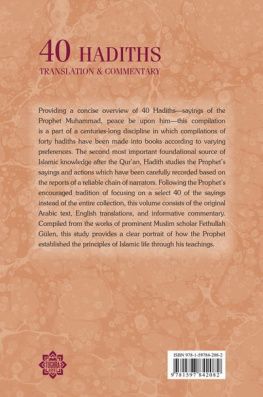Gunny - Prophet Muhammad in French and English Literature
Here you can read online Gunny - Prophet Muhammad in French and English Literature full text of the book (entire story) in english for free. Download pdf and epub, get meaning, cover and reviews about this ebook. year: 2014, publisher: Kube Publishing Ltd, genre: Art. Description of the work, (preface) as well as reviews are available. Best literature library LitArk.com created for fans of good reading and offers a wide selection of genres:
Romance novel
Science fiction
Adventure
Detective
Science
History
Home and family
Prose
Art
Politics
Computer
Non-fiction
Religion
Business
Children
Humor
Choose a favorite category and find really read worthwhile books. Enjoy immersion in the world of imagination, feel the emotions of the characters or learn something new for yourself, make an fascinating discovery.
Prophet Muhammad in French and English Literature: summary, description and annotation
We offer to read an annotation, description, summary or preface (depends on what the author of the book "Prophet Muhammad in French and English Literature" wrote himself). If you haven't found the necessary information about the book — write in the comments, we will try to find it.
Gunny: author's other books
Who wrote Prophet Muhammad in French and English Literature? Find out the surname, the name of the author of the book and a list of all author's works by series.
Prophet Muhammad in French and English Literature — read online for free the complete book (whole text) full work
Below is the text of the book, divided by pages. System saving the place of the last page read, allows you to conveniently read the book "Prophet Muhammad in French and English Literature" online for free, without having to search again every time where you left off. Put a bookmark, and you can go to the page where you finished reading at any time.
Font size:
Interval:
Bookmark:

THE PROPHET MUAMMAD
IN FRENCH AND ENGLISH LITERATURE
THE PROPHET
MUAMMAD
in FRENCH and ENGLISH
LITERATURE, 1650 to the present
AHMAD GUNNY
THE ISLAMIC FOUNDATION
Published by
THE ISLAMIC FOUNDATION
Markfield Conference Centre, Ratby Lane, Markfield,
Leicestershire LE67 9SY, United Kingdom
E-mail:
Website: www.islamic-foundation.com
Quran House, PO Box 30611, Nairobi, Kenya
PMB 3193, Kano Nigeria
Distributed by: Kube Publishing Ltd.
Tel: +44 (0) 1530 249230, Fax: +44 (0) 1530 249656
Email:
Copyright Ahmad Gunny 2010/1431 H
All rights reserved. No part of this publication
may be reproduced, stored in a retrieval system,
or transmitted in any form or by any means,
electronic, mechanical, photocopying, recording
or otherwise, without the prior permission of
the copyright owner.
A Cataloguing-in-Publication Data record for
this book is available from the British Library.
eISBN: 9781847740694
Cover design: Nasir Cadir
Typesetting: Naiem Qaddoura
CONTENTS
Muammad in Christian Thought,
1650-1750
The imagined Muammad from
Marana to Voltaire
Muammad in French
Enlightenment
Muammad in the Age of
Empire to 1900
Sympathy and Scepticism,
1900 to the present
Arabic Consonants
Initial, unexpressed medial and final:

Vowels, diphthongs, etc.

Logic would have required me to complete the investigation I began years ago, on the images of Islam in European writings, with another volume dealing with the same subject in the modern period. This would have meant a complete shift in emphasis: issues such as politics, economics, and the environment, all of increasing importance in our times, would have had to be tackled. However, when Professor Ann Jefferson (New College, Oxford) sent me some material relating to a twentieth-century biographer of Muammad, I began to think that perceptions of the Prophet, independently of other topics in Islam, might prove an equally valid subject of enquiry, even if apparently more limited in scope. Evaluating the responses of European writers to Muammad over a reasonably long period has proved to be a stimulating challenge.
The Oxford Centre for Islamic Studies has been building bridges between Islam and the West. I hope that the present study will contribute to its effort. I, however, bear sole responsibility for the opinions expressed here.
My warm thanks also go to the Islamic Foundation for accepting this volume for publication, which attempts to trace the fortunes of the Prophet Muammad in French and English literature over the last three-and-a-half centuries.
I am indebted to my family for their continuing support.
Ahmad Gunny
The period examined in my previous works on perceptions of Islam in European literature began from the late seventeenth and ended with the nineteenth century, covering about a hundred years at a time in one volume. The present study begins a little earlier, concentrating on perceptions of the Prophet Muammad from the mid-seventeenth century to the twentieth century and beyond. Its longer chronology is justified by the fact that the evaluation of perceptions of Muammad over more than three centuries is not as broad a subject as a study of Islam would have been over the same period; after all, many of the crucial events affecting Muammads life cover a period of only some twenty-two years, from the first revelations in 610 to his death in 632. While there is no Islam without Muammad, it does not follow that he and Islam are the same thing, as some Westerners seem to think.
The earlier start should allow me to fill in the gaps I had left in the previous studies, especially with regard to the attitudes of English Protestants to the Prophet in the seventeenth century (see Bibliothque orientale (1697) is brief, as the focus here is on the latter. The last chapter (on the modern period) is completely new territory.
Even older territory, if approached from a slightly different angle, may yield interesting results. In any case, it is unthinkable that the Enlightenment (earlier periods too, provided one does not go as far back as the Middle Ages which were not able or unwilling to engage seriously with Islam and Muammad) could be overlooked. Going back to a fairly distant past certainly exposes readers, especially Muslim readers, to the painful experience of reading incessant denunciations of Muammad as an impostor. Yet this experience is unavoidable unless one is embarking on an exercise in hagiography. Moreover, only by examining past responses to Muammad can one avoid giving the impression that he had always been recognized as a Prophet. Previous centuries could show if there has been an evolution in his fortunes in the French and English literature of modern times.
If the study as a whole appears to be unevenly weighted, with slightly more space devoted to the seventeenth and eighteenth centuries than the nineteenth and twentieth centuries, it is not because the latter are deemed to be less important; while even-weighting is a reasonable target to aim at, it should not, however, be pursued at any cost. If, for example, attention were devoted to some aspects of the works on Qurnic studies by scholars such as Theodor Nldeke in the nineteenth century, or Richard Bell and Rgis Blachre in the twentieth century, this might result in a confusing situation for many Muslims. These writers, in their attempts to renew Islamic studies, propose a reordering of the Sras of the Qurn, which may be of interest to non-Muslims, but which would leave the majority of Muslims bewildered. The latter are more comfortable with the traditional ordering, which European writers of the early period do not attempt to disturb. Fidelity to European thought surely does not require me to give full exposure to an end product that is not recognized by Muslims? On the other hand, the recommendation, by many Orientalists, that Muslim sources should be jettisoned in favour of non-Muslim sources (that prove to be unreliable on close examination) will be discussed without prioritising the latter.
To make Muammad the sustained centre of attention for much of the time, rather than the rest of the Arab-Muslim civilisation, is to face a daunting task which, nevertheless, has its rewards. Keeping the discussion within strict chronological boundaries, desirable as this may be, is also quite difficult. Moreover, an assessment of the man is to a large extent governed by external factors and attitudes to a world religion, which has renewed its challenge to the Christian West in terms of ideology and space. Of note is the reversal of roles and fortunes that has taken place over the last four centuries. The Ottoman Empire was extending into central Europe in the sixteenth century, attacking Mediterranean outposts such as Malta, Cyprus, Rhodes, and Crete. The end of the seventeenth century, however, marked the end of an era in its history. Following the defeat of its forces at the gates of Vienna (1683), and the signing of the Treaty of Karlowitz, Croatia (in 1699), the Ottomans were left with only a third of their Hungarian possessions. They were no longer the aggressive, expanding military power that had been feared for more than three centuries by Christian countries. The decline in their fortunes, which continued until 1923, undoubtedly had some impact on the image of Muammad in the West.
Font size:
Interval:
Bookmark:
Similar books «Prophet Muhammad in French and English Literature»
Look at similar books to Prophet Muhammad in French and English Literature. We have selected literature similar in name and meaning in the hope of providing readers with more options to find new, interesting, not yet read works.
Discussion, reviews of the book Prophet Muhammad in French and English Literature and just readers' own opinions. Leave your comments, write what you think about the work, its meaning or the main characters. Specify what exactly you liked and what you didn't like, and why you think so.

